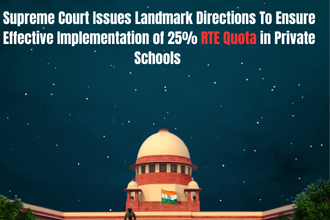In a landmark ruling on April 15, 2025, the Supreme Court of India issued a scathing critique of the Uttar Pradesh government and the Allahabad High Court over their handling of a high-profile child trafficking case, while simultaneously laying down comprehensive guidelines to streamline the trial process in such sensitive cases. The apex court directed all High Courts in the country to ensure that child trafficking cases are tried and completed within six months, with day-to-day hearings wherever possible.
The Bench comprising Justice JB Pardiwala and Justice R Mahadevan also held that in any instance where a newborn is stolen from a hospital, the immediate suspension of the hospital’s license must be the first step taken.
Case Background: Trafficking of a Newborn for ₹4 Lakh
The case under scrutiny involved the illegal trafficking of a newborn from a hospital in Uttar Pradesh, who was subsequently delivered to a couple desperate for a male child. According to the Supreme Court’s findings, the accused knowingly purchased the baby for ₹4 lakh, fully aware that the child had been stolen. This act, the Court observed, was not just illegal but deeply immoral, as it exploited both the vulnerable biological mother and the child.
Senior Advocate Aparna Bhat appeared on behalf of petitioner Sanjay, bringing to the Court’s attention the plight of victims in an organized child trafficking racket. The matter was heard as part of anticipatory bail applications filed by several accused in the case.
Supreme Court’s Strong Rebuke to Allahabad High Court and Uttar Pradesh Government
The Supreme Court rebuked the Allahabad High Court for its casual handling of bail applications, stating that this lax approach led to several accused persons absconding. The Bench noted:
“The High Court dealt with bail applications callously and it led to many accused to abscond. These accused pose a serious threat to society. The least that was required from the High Court was to impose a condition to mark presence at the police station every week.”
The Court was equally harsh in its criticism of the State of Uttar Pradesh, questioning why no appeal had been filed against the bail orders and calling out the state’s lack of seriousness in tackling the issue:
“We are thoroughly disappointed how State of UP handled this and why no appeal was made. No seriousness was shown worth the name.”
Guidelines Issued by the Supreme Court
The top court’s ruling is notable for its comprehensive directives aimed at preventing and expediting the prosecution of child trafficking cases. The key directions include:
- High Courts across India must issue directions to subordinate courts to complete trials in child trafficking cases within six months.
- Day-to-day hearings should be conducted to ensure swift justice.
- Three special public prosecutors to be appointed by the State government.
- Police protection to be granted to key witnesses.
- In cases where *newborns are trafficked from hospitals, the *hospital’s license must be suspended immediately.
- CJM and ACJM Varanasi directed to commit the case to Sessions Court within two weeks.
- *Charges to be framed within one week, followed by *evidence recording within another week.
- If any accused are absconding, the Trial Court to issue non-bailable warrants.
- Education to be provided to trafficked children under the Right to Education Act.
- Compensation to be awarded to victims under BNSS and relevant Uttar Pradesh laws.
Taking Cognizance of Media Reports
The Court also took suo motu cognizance of a Times of India report which highlighted the workings of organized child trafficking gangs, especially in Delhi and surrounding areas. The Bench has directed the concerned police officers to submit a detailed report outlining the steps taken to dismantle these criminal networks.
“We have taken cognizance of the Times of India report and directed the police to report status of the case and what steps are being taken to tackle such gangs working outside and inside Delhi.”
A Message on Institutional Accountability
This judgment sends a powerful message about institutional accountability, with the Court emphasizing that laxity in implementing its orders would be treated as contempt of court. In the words of Justice Pardiwala:
“Any laxity showing to implement the directions would be taken seriously and treated as contempt of court.”
This ruling is expected to not only impact ongoing cases in Uttar Pradesh but also trigger systemic reforms across states regarding how child trafficking cases are registered, prosecuted, and monitored.
Legal Representation and Government Stand
- Senior Advocate Aparna Bhat appeared for the petitioner.
- The Union of India was represented by Additional Solicitor General Aishwarya Bhati.
- The State of Uttar Pradesh was represented by Advocate Garvesh Kabra.
- Advocates Sarad Kumar Singhania and Milind Kumar appeared for the states of Madhya Pradesh and Rajasthan, respectively.
Conclusion: Supreme Court’s Proactive Stand on Child Protection
The Supreme Court’s ruling reflects a proactive judicial approach in safeguarding child rights and ensuring justice for trafficking victims. The judgment places the onus on the state machinery, law enforcement agencies, and subordinate judiciary to act with urgency, compassion, and vigilance in dealing with such heinous crimes.
By laying down a clear framework for time-bound trials, directing hospital accountability, and mandating special prosecutors, the apex court has once again reaffirmed its role as a guardian of fundamental rights, especially for the most vulnerable sections of society—children.
The matter is now posted for further hearing on April 21, 2025.


